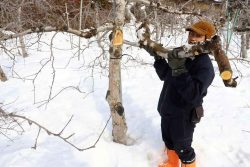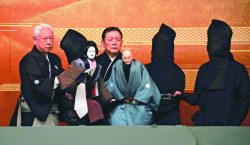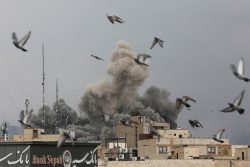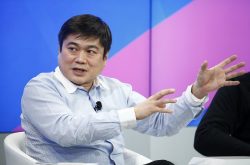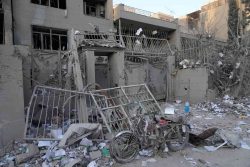Build a Society Filled with Peace, Vitality / Overcome Hardships Using Wisdom and Courage
5:00 JST, January 1, 2021
New Year’s reminds people how precious it is to be able to cheerfully exchange the usual greeting “Happy New Year!”
The landscape has completely changed. The annual visit of the public to the Imperial Palace to pay New Year respects was canceled, and the Emperor’s speech at the beginning of the year was changed to a video message. Who could have imagined a year ago that people would welcome New Year’s Day in such difficult circumstances?
It is said, however, that adversity is opportunity. It is better to think that it was fortunate to have been made aware of myriad problems, such as the vulnerability of the medical system and distortions in society, through the catastrophe caused by the spread of novel coronavirus infections.
This should be used as a good opportunity to implement the reforms that need to be carried out and to build a peaceful, healthy, vibrant society after overcoming hardships. This year will be the starting point.
First and foremost, all efforts should be made to bring the pandemic under control. It is only natural to seek a balance with economic recovery, but economic activities will not be able to run smoothly if the spread of infections is not contained.
There are a variety of factors that could damage the economy, and countermeasures are not uniform. Natural disasters, such as earthquakes and typhoons, can damage production facilities and strike a blow to supplies, so rebuilding infrastructure would be an urgent task. When an economic bubble bursts, it is necessary to reconstruct the financial system and stimulate demand.
Infection prevention top priority
Infectious diseases spread through human contact and impede production activities, hindering supply and demand simultaneously. If this happens, the first countermeasure is to put an end to the pandemic.
What needs to be done is indicated in the brief title of an article by a U.S. think tank, the Institute for New Economic Thinking: “To Save the Economy, Save People First.”
Though it took too long to come to the decision, Prime Minister Yoshihide Suga temporarily suspending the Go To Travel tourism promotion campaign for the year-end and New Year’s period can be praised.
If this is taken as an opportunity for containing the spread of infections, helping pave the way to hosting the Olympic and Paralympic Games without incident, Japan can perhaps show a proud face to the world.
But even if that best-case scenario were to be realized, it wouldn’t end the fight against the infectious disease. It will take time for COVID-19 vaccines to become widely available and there is no telling when the infection might spread again.
There is also a fear that a new plague with a different type of virus could come in a few years. In fact, a Health, Labor and Welfare Ministry panel of experts in 2010 proposed strengthening the system of specialized institutions, including public health centers, and relevant staffing based on the experience of a new strain of influenza.
The proposal was largely forgotten, resulting in the havoc during this current pandemic. We must not repeat that mistake. It is necessary to recognize that strengthening the medical system is an urgent task that should be carried out immediately.
The coronavirus pandemic is a problem not only for Japan. Countries all around the world are in the midst of turmoil. This adversity cannot be overcome unless the entire international community cooperates in such areas as the movement of people, the supply of vaccines and relevant medical measures.
It will be difficult to revitalize the economy without stable international cooperation, including the securing of supply chains and bases of production. Nevertheless, the world is becoming increasingly tense due to worsening relations between the United States and China amid trade friction and security issues.
Economic globalization has spurred the development of the world economy, but China, which has taken advantage of this to gain in strength, is accelerating its expansion of military power. China is expanding its sphere of influence not only in the East China Sea and the South China Sea, but also in outer space and cyberspace.
World enters period of change
Under the administration of U.S. President Donald Trump, the United States has been taking a more confrontational stance toward China and Russia, among other countries, aiming to enhance its own nuclear and conventional military strength under an “America First” policy. With the United Kingdom leaving the European Union and the Middle East in a state of flux, the world is in the midst of upheaval.
While the international community is urged to make concerted efforts to tackle environmental problems, such as global warming, there is also growing conflict and competition among nations in setting standards for environmental regulations.
The turmoil amid the coronavirus pandemic; the disturbance of international order; collaboration and competition: This is a complicated era in which these four elements intertwine and advance simultaneously.
To adapt to the situation, self-reformation is necessary. At the same time, however, change must not lead to the loss of important values, such as peace and security or freedom and democracy, that are associated with the fundamentals of a nation.
What should be changed and what should be protected to the end? The wisdom to assess matters and the courage to carry out measures are now being put to the test.
Japan should first speed up efforts to strengthen the Japan-U.S. alliance with the new administration of U.S. President-elect Joe Biden, along with actively participating in efforts by the international community to resolve issues and draw up rules, to secure a voice in the international community.
If Japan sits on the sidelines, the nation could be forced to accept unfavorable conditions and its national interests could be compromised.
Delays in areas such as developing gasoline-free vehicles or actively using digital technologies will force Japan to purchase expensive foreign products or pay patent fees. The burden on the public will increase and domestic industries will be hollowed out.
Instead of merely following the changes in the situation, it is surely important to proceed by confronting difficult issues. On top of preparing the country to take on the issues, shouldn’t it be Japan’s role to take the initiative in forming new frameworks for multilateral cooperation, such as for preventing the use of space as an arena for resource competition?
To this end as well, what is important is national power. Japan’s foundation is economic power. It is necessary to work on rebuilding Japan’s economic structure because even if the pandemic is brought under control, the long-standing roots of problems in the Japanese economy would not be completely eradicated.
Aim to enhance national power
What is worrisome is the slowdown in growth. With corporate retained earnings of ¥475 trillion and household financial assets of ¥1.901 quadrillion, the country is in an unprecedented state of surplus cash, but corporate investment and personal consumption remain sluggish. Anxiety associated with uncertainty about the future seems to have put a brake on growth.
Along with the government’s growth strategy, reform of the social security system must be implemented to restore social vitality.
In addition, the national debt exceeds ¥1 quadrillion. It is unacceptable to also leave the country in a critical fiscal condition in which the outstanding long-term debt of the central and local governments is more than twice the gross domestic product.
Technology, the driving force of economic development, is an important element of national power. The success of the asteroid probe Hayabusa2 late last year proved Japan’s technological prowess. There are also many Japanese scientists who have won Nobel Prizes.
Stop human resources outflow
Despite all this, it has been pointed out that information technology and digital technologies are lagging behind. Why on earth is that? There may be several causes, but one of them may be a corporate culture that does not place importance on engineers and researchers.
If companies focus too much on improving productivity and efficiency, putting priority on improving visible corporate figures by reducing the number of employees, people with excellent skills will be recruited by Chinese and South Korean companies. There have been a number of such cases.
Even now, it is said that there are many young researchers who cannot get positions at Japanese universities or research institutes, so they are employed at Chinese research institutes at a high salary. How great a loss to Japan’s national power has it been to let valuable human resources leave before one’s very eyes?
Although there is a noticeable neoliberal discourse criticizing the low productivity of small and midsize enterprises, it must not be overlooked that many of the engineers who supported the Hayabusa2 were from small factories, with only dozens of employees, set up in towns.
Technology is also a human activity. It is important to remember that strength in human resources is the foundation of national power.
The same can be said of the challenges of digitization. Administrative procedures at central and local governments should be digitized to offer the public greater convenience. But when it comes to digitizing textbooks, that’s another story.
It would be effective to use video and audio from digital devices as supplementary teaching materials, but abandoning the use of textbooks printed on paper and switching to digital tablets is really a case of mistaking fundamental matters for trivial ones.
By reading books and writing compositions, people acquire knowledge and the ability to think and grow as human beings. Mathematician Kiyoshi Oka wrote, “Emotion is at the center of our being,” in his work “Shunsho Juwa” (Ten stories for a spring evening). The fundamentals of education should not be mistaken.
Political stability is also an important element of national power. No matter how strong the economy is, if a leader is not trusted by the people, other countries will not have trust either because they will see that the leader is vulnerable.
It is unbearable to see politicians lying at Diet hearings and stubbornly refusing to explain political decisions that raise questions.
Political trust is nation’s base
In order to secure the nation’s peace and security in a turbulent world, it is essential for Japan to have the skills to communicate its position to the outside world in order to win the understanding of the international community.
According to a joint opinion poll conducted by The Yomiuri Shimbun and U.S. polling firm Gallup, Japan’s Diet ranked last in a survey on the public’s trust in organizations including public institutions, with 23% of respondents in Japan saying they trust the Diet. This is woeful even when compared to the U.S. Congress, which was also ranked at the bottom, with 33% of U.S. respondents saying they trust Congress.
Leaders of the ruling and opposition parties should keep this in mind when they act. Furthermore, the public must also hold firm opinions about politics. This is also an election year.
— The original Japanese article appeared in The Yomiuri Shimbun on Jan. 1, 2021.
Top Articles in Editorial & Columns
-

Riku-Ryu Pair Wins Gold Medal: Their Strong Bond Leads to Major Comeback Victory
-

Reciprocal Tariffs Ruled Illegal: Judiciary Would Not Tolerate President’s High-Handed Approach
-

China Provoked Takaichi into Risky Move of Dissolving House of Representatives, But It’s a Gamble She Just Might Win
-

Japan’s Plan for Investment in U.S.: Aim for Mutual Development by Ensuring Profitability
-

Flu Cases Surging Again: Infection Can Also Be Prevented by Humidifying Indoor Spaces
JN ACCESS RANKING
-

Producer Behind Pop Group XG Arrested for Cocaine Possession
-

Japan PM Takaichi’s Cabinet Resigns en Masse
-

Man Infected with Measles Reportedly Dined at Restaurant in Tokyo Station
-

Israeli Ambassador to Japan Speaks about Japan’s Role in the Reconstruction of Gaza
-

Videos Plagiarized, Reposted with False Subtitles Claiming ‘Ryukyu Belongs to China’; Anti-China False Information Also Posted in Japan




